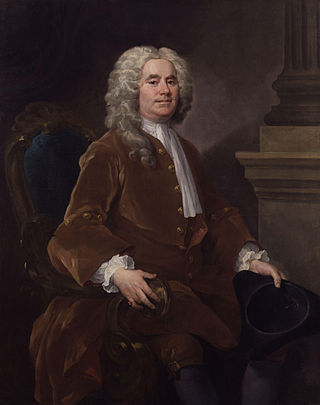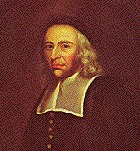Related Research Articles

William Jones, FRS was a Welsh mathematician, most noted for his use of the symbol π to represent the ratio of the circumference of a circle to its diameter. He was a close friend of Sir Isaac Newton and Sir Edmund Halley. In November 1711 he became a Fellow of the Royal Society, and was later its vice-president.

John Leverett was an early Anglo-American lawyer, politician, educator, and President of Harvard College.

Thomas Trevor, 1st Baron Trevor, was a British judge and politician who was Attorney-General and later Lord Privy Seal.
The Yusuf Hamied 1702 Chair of Chemistry is one of the senior professorships at the University of Cambridge, based in the Yusuf Hamied Department of Chemistry.

James Ogilvy, 4th Earl of Findlater and 1st Earl of Seafield, was a Scottish politician.
James Petiver was a London apothecary, a fellow of the Royal Society as well as London's informal Temple Coffee House Botany Club, famous for his specimen collections in which he traded and study of botany and entomology. He corresponded with John Ray and Maria Sibylla Merian. Some of his notes and specimens were used by Carolus Linnaeus in descriptions of new species. The genus Petiveria was named in his honour by Charles Plumier. His collections were bought by Sir Hans Sloane and became a part of the Natural History Museum.

Fellowship of the Royal Society of Edinburgh (FRSE) is an award granted to individuals that the Royal Society of Edinburgh, Scotland's national academy of science and letters, judged to be "eminently distinguished in their subject". This society received a royal charter in 1783, allowing for its expansion.

John Montagu or Mountague was an English churchman and academic.
George Downing Liveing FRS was an English chemist and spectroscopist.
The Sheriff of Clackmannan was historically the office responsible for enforcing law and order in Clackmannan, Scotland and bringing criminals to justice. Prior to 1748 most sheriffdoms were held on a hereditary basis. From that date, following the Jacobite uprising of 1745, the hereditary sheriffs were replaced by salaried sheriff-deputes, qualified advocates who were members of the Scottish Bar.
References
- ↑ "Fellows of the Royal Society", Royal Society. "Fellowship from 1660 onwards" (xlsx file on Google Docs via the Royal Society)